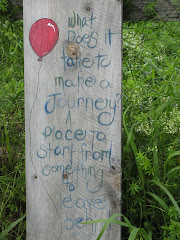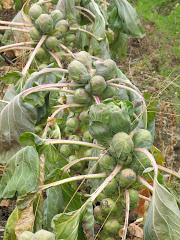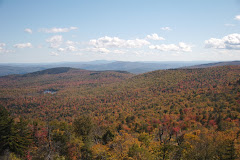Yesterday we drove three hours north to Fair Haven, Vermont to visit Over the Hill Slaughterhouse, where we take most of our animals to get killed and butchered.
The actual experience was less horrible than I thought it would be. I was prepared to be so revolted by it that I would have to reconsider raising animals for meat. And while it was somewhat disturbing, and definatley hard to watch an animal be killed, I was surprised at how...okay...I was with much of the process. It raised a lot of questions about the act of killing, and what it means to raise animals for that specific purpose.
Visiting the slaughterhouse was the first thing in a while that has made me rethink my basic philosophy about eating meat: if I know the farmer, and approve of her methods, I'm happy to eat meat now and then. I enjoy it. Yesterday brought into clear relief the fact that the life of the animal isn't the only thing I have to consider - the way in which it is killed is just as important.
Over The Hill is a small slaughterhouse. They kill and process 15-20 cows per day at most. We saw the kill floor, the two cooling rooms (one where the animal hangs directly after slaughter and one larger and warmer room where the carcasses hang for 7-14 days.), and the butcher room where a team of about 5 actually cut up the meat.
We saw two pigs killed while we were there. Over the Hill, which is certified by the USDA and the Humane Slaughter Act, uses the captive bolt method to stun the animals and render them unconscious. The air-compression gun is fired once somewhere on the animal's head, which renders them unconscious to pain. They are then cut, bled, and hung. It was incredibly disturbing to watch this process, especially since pigs' nervous system convulse and spasm after they are dead.
By any standards, Over the Hill is a clean, humane slaughterhouse. The workers were good with the animals - not rough, but not reverent, either. The animals come in one at a time to be shot. However, I couldn't help thinking how much worse it would have been if I had been watching a cow or lamb I knew and raised to shot and cut so quickly. What disturbed me the most was the mechanization of it, and the lack of reverence and respect.
Overall, the trip raised more questions than it answered.
Can I eat something that isn't beautiful? This struck me the minute I went into the butchering room. I see the beauty in a basket of tomatoes and peppers. But the carcasses hanging in that room did not strike me as beautiful.
When did the tradition of ritual killing become grotesque (or has it always been)? The killing of animals is deeply rooted in our history. In my heart, I believe at one time it was less brutal and more reverent. How can we bring that mindset back into our culture?
What struck me the most was this feeling that death should be a ceremony. I do not believe that the purposeful killing of animals should be mechanized, industrial, or common. It should be done with humility, reverence, and ritual. I was surprised that this was what bothered me most about watching the a pig killed. Not entirely the death itself, but the routine of it, the quick transition from the act of death to the next bit of work. It is not a judgment on the slaughterhouse or the folks who work there, but on the ways in which killing seems acceptable to us. It is no small thing to take away a life. If I ever raise animals for meat, I want that knowledge to permeate the entire process.
I do think that animals raised for meat have a place in whole, healthy agricultural systems. But the killing of those animals is more complex than I ever realized before. Good systems are genearly fundamentally quiet, unobtrusive, and beautiful. As I think about what kind of future I want to make for myself in this world, I am gaging everything I do by those standards. Even if I raise sheep and cows on good grass, use their manure to nurture my crops, and let them live out their lives in the clean sunshine as they were intended to, it is for nothing if their deaths are not quiet, respectful, and purported with reverence.
Tuesday, November 18, 2008
Subscribe to:
Post Comments (Atom)





































































No comments:
Post a Comment